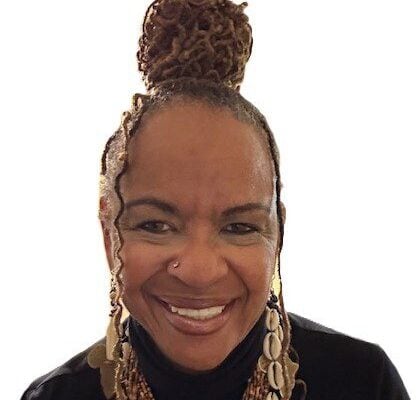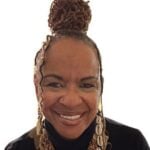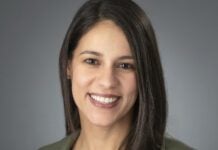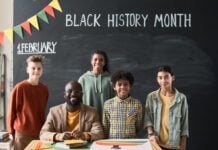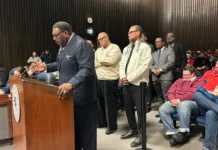“What shall I tell my children who are Black
Of what it means to be a captive in this dark skin?
What shall I tell my dear one, fruit of my womb,
Of how beautiful they are when everywhere they turn
They are faced with abhorrence of everything that is Black?”
These are the opening lines from Margaret Burroughs’ thought-provoking 1963 poem. Over 60 years later, her words still echo with truth and urgency—especially now, as Black children across the country prepare to return to school.
Burroughs’ poem remains both a question and a charge: What will we teach our children? What truths will we pass down when the world often tries to erase or distort our contributions?
As another academic year begins, Black parents, guardians and communities must pause to ask: What will my child really learn this year?
Yes, they’ll study math, science and writing — but what about the deeper truths of history, geography, and culture? Will they learn about the true origins of humanity in Africa? Will they explore the brilliance of ancient kingdoms — Kush, Mali, Nubia, Zimbabwe — and how Black people throughout the Continent mapped the stars long before telescopes?
Specifically, will they be told that the Dogon people of West Africa charted the Sirius B star system through 1990 with astonishing accuracy, at least six centuries before European astronomers saw it in 1862? Or that Christianity thrived across the African continent long before slavery and colonialism? Will their history books mention that Lewis Latimer improved Edison’s light bulb? Or that Dr. Charles Drew laid the foundation for modern blood banking through his inventions of blood collection and storage techniques?
Will they study Amanda Gorman’s inauguration poem “The Hill We Climb,” in which she reminds us that we are striving to “compose a country committed to all cultures, colors, characters and conditions of man”?
Will they leave the classroom understanding that Black genius is not an exception, but a longstanding reality?
Because the truth is this: captivity didn’t crush Black genius. Slavery didn’t stifle it. Jim Crow didn’t jinx it. Lynchings didn’t create a lapse in it. Mass incarceration hasn’t minimized it.
Black genius persisted through every storm — creating, building, resisting, expanding knowledge.
But here’s the question we must ask ourselves: Do we believe in Black genius? Really?
Consider the story of Ruby Bridges in 1960, who at just 6 years old became the first Black child to integrate an all-white elementary school in the South. Escorted daily by U.S. Marshals, she endured isolation, hostility, and racism, all for the hope of “better” education. But was it truly better?
Her teacher, a white woman, was unprepared to nurture her identity or affirm her value as a young Black girl. And it’s worth noting that the NAACP, largely led by white leadership at the time, pushed for this “experiment.” Just 30 years earlier, W.E.B. Du Bois left the same organization in protest, frustrated by its refusal to support Black political candidates.
Integration came at a high cost. We gave up Black-owned businesses, self-sustaining neighborhoods, and community schools staffed by teachers who saw our children’s brilliance firsthand. We abandoned our infrastructure because we fell for a false promise: that white was better.
Even Dr. Martin Luther King Jr. later questioned the benefits of integration. In a 1968 conversation with Harry Belafonte, he reflected, “I fear I may have integrated my people into a burning house.”
The house is still burning. Systemic injustice remains. But here’s what we know for sure: Even a burning house cannot stop Black genius.
As we send our children back into classrooms, Margaret Burroughs’ call resounds: We must take responsibility for their education. We must seek the truth, even when the truth is buried. We must become the storytellers, the knowledge keepers, the truth bearers.
Why? Because we cannot rely solely on school systems to teach what they were never created to affirm.
GriotSpeaks Virtual Modules is one way forward — a platform built to replace myth with truth, to revive history that has been hidden, and to empower parents and caregivers with the tools to teach with confidence and cultural clarity. The online modules begin Sept. 4. Go to www.griotspeaks.com for information and to register.
To survive the burning house, as Belafonte suggested, perhaps we must become the firefighters.
And, while we’re putting out fires of injustice with knowledge, let us fan the flames of Black brilliance. Our future depends on it.
Maxine Bryant, Ph.D., founder of GriotSpeaks, author, and African American culture keeper. Dr. Bryant replaces mythology with truth about Africa and the African Diaspora experience. She can be reached at mlb@drmaxinebryant.com or found on her website at www.drmaxinebryant.com.
MAXINE BRYANT
Maxine Bryant, Ph.D. is the founder of GriotSpeaks, author and African-American culture keeper. Dr. Bryant replaces mythology with truth about Africa and the African Diaspora experience. Learn more about her at www.drmaxinebryant.com and email her at mlb@drmaxinebryant.com.

